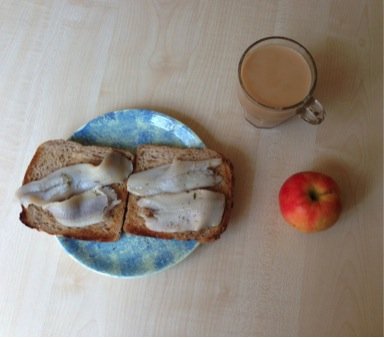
Eating Breakfast From the Old Homeland Around the World

Eating Breakfast From the Old Homeland Around the World
Pickled Herring in Vilnius
When my grandfather visited the United States, we would buy jars of pickled herring. Every morning, he would sit at our table, butter two slices of dark bread, and gingerly place little pieces of pickled fish from the jars on top. Then, he would carefully—and happily—bite into his sandwich. I remember two admonitions: “This is what our ancestors used to eat,” and “herring is too strong for a child’s stomach!” But after I tried herring on rye bread for the first time, I was hooked. Soon, herring was a regular and welcome part of my diet, especially on the Jewish holidays, when my mother would lay out a plate of pickled herring as a forshpeize for our guests. I learned, when I was older, that pickled herring had long been a traditional food for my Lithuanian Jewish ancestors, as it is for the peoples of the Baltic Sea today.
Later, I would take this simple food wherever I went, from New York to Chicago to Cape Town to Oxford. In Chicago, the herring was so cheap that I could eat it for breakfast almost every day. In Oxford, it is so expensive that it was a special treat: perhaps once a week, I will buy a small packet of herring for breakfast the next day. In both cities, however, rye bread was far easier to come by. Sometimes I have one without the other—is there something that doesn’t go well with rye bread? When I eat both, however, I am instantly home in New York, and six years old. I think about my grandfather, now ninety-three and still guzzling pickled fish in his nursing home. And I think, sometimes, about my ancestors.
For many of us Litvaks—Ashkenazi Jews of Lithuanian descent—herring is a reminder of Di Alter Heim: the old homeland, Lithuania. Though our ancestors largely left, or were massacred by the Nazis, the memory of Lita still lives in every plate of herring laid out on a synagogue table, and in every slice of rye bread, dark or light, that we eat. Though we are now in another diaspora alongside our Jewish one—away from Lithuania in South Africa, the United States, or Israel—when one of us eats a piece of herring on rye bread, we are brought back in a nostalgic reverie to the small towns of origin we may have never visited.
I went “back” to Lithuania for the first time in March. My first memory there is of herring on rye bread on a blustery March day in a coffee shop in Vilnius. At first, I was skeptical of the plate before me on the table: the rye bread was a bit lighter than I remembered, the herring a slightly darker color. Then, I took a bite, and I once again remembered clambering up to the dining table by my grandfather as he picked the pieces of herring out of the jar. And here I was in the homeland eating it again. It felt like a homecoming, indeed.